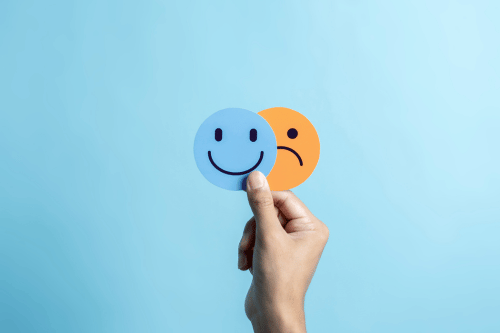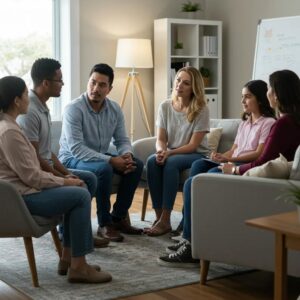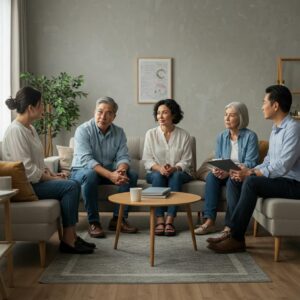Mental Health Group Activities for Adults: A Comprehensive Guide
Mental health group activities for adults are integral to promoting emotional health, personal growth, and mental wellness. In group therapy settings, participants engage in interactive exercises that foster communication, connection, and self-reflection. These activities offer a safe and supportive environment where individuals can share their experiences, confront mental health issues, and work together towards healing.
Whether dealing with specific mental health disorders, stress, or seeking personal development, mental health group therapy provides therapeutic benefits that can lead to significant personal transformation. Therapy activities for adults encompass various types of mental health group therapy activities that facilitate skill development, manage thoughts and emotions, and enhance the therapeutic process through structured group dynamics and modern tools like apps for organizing and planning these activities.
In this guide, we’ll explore various group therapy activities designed for adults, how these activities are structured, and the numerous benefits they provide. By breaking down the essential aspects of group therapy, we aim to give you a deeper understanding of its role in improving mental health and well-being.
What Are Mental Health Group Activities?
Mental health group activities are structured exercises designed to help individuals in a group therapy setting address their emotional and psychological challenges. These activities are often led by mental health professionals who facilitate discussions, guide interactions, and ensure that participants feel safe and respected.
The Role of Group Therapy in Mental Health
Group therapy is a powerful tool for healing. It offers individuals the opportunity to connect with others who are facing similar challenges, which reduces feelings of isolation and promotes emotional health. Through group therapy activities, participants can work on communication skills, coping strategies, and self-reflection, all while receiving emotional support from other group members.
Key Benefits of Mental Health Group Activities for Adults
Emotional support from group members is one of the primary benefits of group therapy. Group members can share their personal stories, receive feedback, and offer insights to one another. This creates a support system that can be incredibly empowering for individuals dealing with mental health challenges.
Mental health group activities for adults help reduce feelings of isolation. Many individuals struggling with mental health disorders often feel alone in their experiences. Group therapy provides a space where participants realize they are not alone, helping them feel connected and supported.
Coping strategies are essential for managing mental health disorders. In group therapy sessions, participants learn various techniques for handling stress, anxiety, and other mental health challenges. These strategies are discussed in group settings and practiced through various therapy activities.

Types of Group Therapy
Group therapy encompasses various approaches, each tailored to address specific needs and goals. Understanding the different types of group therapy can help individuals and mental health professionals choose the most appropriate method for their situation.
Cognitive Behavioral Therapy (CBT) Groups: These groups focus on identifying and changing negative thought patterns and behaviors. Participants learn to challenge their cognitive distortions and develop healthier ways of thinking and acting. CBT group therapy activities often include thought-challenging exercises and role-playing scenarios.
Psychoeducational Groups: These groups aim to educate participants about their mental health condition, including its symptoms, causes, prognosis, treatments, and progression. By providing valuable information, psychoeducational groups empower individuals to manage their conditions more effectively.
Support Groups: Support groups provide a platform for individuals with similar issues to share experiences, receive support, and connect with others. These groups are particularly beneficial for those dealing with specific mental health disorders, as they offer a sense of community and understanding.
Skills Development Groups: These groups help participants develop new skills, such as coping strategies, problem-solving techniques, and interpersonal skills. Skills development groups are designed to equip individuals with practical tools to manage their mental health and improve their daily lives.
Interpersonal Therapy (IPT) Groups: IPT groups focus on improving interpersonal relationships and communication skills. Participants work on understanding and addressing issues in their relationships, which can lead to better emotional health and well-being.
Dialectical Behavior Therapy (DBT) Groups: DBT groups emphasize developing emotional regulation, distress tolerance, and mindfulness skills. These groups are particularly effective for individuals with borderline personality disorder and other conditions involving emotional dysregulation.
Mindfulness-Based Stress Reduction (MBSR) Groups: MBSR groups teach mindfulness techniques to reduce stress and improve overall well-being. Participants learn to practice mindfulness meditation, which can help them manage stress, anxiety, and other mental health challenges.
The Structure of Mental Health Group Therapy Sessions
Group therapy sessions are typically structured to include a mix of discussions, activities, and reflections. Each session may focus on a particular theme, such as communication, self-esteem, or stress management. Mental health professionals guide these sessions, ensuring that the environment remains respectful and supportive.
Effective Strategies for Leading Group Therapy Sessions
Leading successful group therapy sessions requires a combination of preparation, flexibility, and effective facilitation techniques. Here are some strategies to ensure your group therapy sessions are productive and supportive:
Establishing Clear Goals and Expectations: At the beginning of the group therapy session, define the group’s purpose, goals, and expectations. This helps ensure that all group members are on the same page and understand the objectives of the session.
Creating a Safe and Supportive Environment: Foster a sense of trust, respect, and empathy among group members. Encourage open communication and ensure that everyone feels comfortable sharing their thoughts and experiences without fear of judgment.
Encouraging Active Participation: Use various techniques, such as open-ended questions and prompts, to engage all group members. Encourage everyone to contribute to discussions and activities, ensuring that no one feels left out.
Managing Conflict and Resistance: Address conflicts and resistance in a constructive manner. Use these moments as opportunities for growth and learning, helping group members understand and work through their differences.
Providing Feedback and Guidance: Offer constructive feedback and guidance to help group members achieve their goals. Be supportive and empathetic, providing encouragement and positive reinforcement.
Being Adaptable and Flexible: Be prepared to adjust the group’s agenda or approach as needed to accommodate the group’s needs. Flexibility is key to ensuring that the group therapy session remains relevant and effective for all participants.
Group Therapy Activities Tailored to Specific Needs
Not all group therapy activities are the same. Some are designed for individuals dealing with specific mental health disorders, while others focus on personal growth and self-reflection. Below are some popular activities used in group therapy for adults.
Cognitive Behavioral Therapy (CBT) Exercises
Cognitive Behavioral Therapy (CBT) is one of the most common approaches in mental health treatment. CBT group therapy activities help individuals identify negative thought patterns and replace them with healthier, more constructive thoughts. In a group setting, participants can share their progress and learn from the experiences of others.
CBT activities include thought-challenging exercises, cognitive restructuring tasks, and role-playing scenarios to practice new behaviors.

Art Therapy in Group Settings
Art therapy allows individuals to express their emotions in a non-verbal way. This type of group therapy activity involves using creative mediums such as drawing, painting, or sculpting to explore feelings, reduce stress, and improve self-awareness.
Art therapy encourages emotional expression without the need for words, promotes self-reflection and personal growth, and helps in managing stress and improving self-esteem.
Group Discussions and Story Sharing
Group sessions are a fundamental part of group therapy, emphasizing the importance of engagement and collaboration. These sessions encourage participants to share their personal stories, which can lead to deep connections and valuable insights. Group members often feel a sense of relief when they realize that others are going through similar experiences.
Key elements of group discussions include sharing personal stories, group feedback and support, and emotional bonding through shared experiences.
Fun Group Therapy Activities
Therapy doesn’t always have to be serious. Fun group therapy activities can make sessions more engaging and enjoyable, encouraging participants to open up more easily. These activities often serve as icebreakers, helping group members feel comfortable with one another.
Examples of fun activities include “Two Truths and a Lie,” a game that encourages participants to share personal facts, fostering interaction. Role-playing games, where participants take on different roles to practice communication and coping skills, and group trivia games, which help break the ice and build group cohesion, are also effective.
Role-Playing Scenarios in Group Therapy
Role-playing is an effective way for participants to practice new communication skills and coping strategies in a safe environment. These scenarios allow individuals to act out real-life situations, helping them gain confidence in handling similar experiences outside the group.
Role-playing provides a safe environment to experiment with new behaviors, encourages personal growth and self-reflection, and strengthens communication skills.
Self-Reflection and Journaling
Self-reflection is a key component of many mental health group activities. Participants may be asked to journal about their experiences or reflect on specific events that have impacted their mental health. This activity encourages introspection and helps individuals gain clarity on their thoughts and emotions.
Journaling promotes self-awareness and insight into personal challenges, emotional processing in a structured way, and development of new coping strategies.
Team-Building Exercises for Group Cohesion
Team-building exercises are designed to strengthen the bonds between group members. These activities promote collaboration, problem-solving, and trust, which are essential for creating a supportive environment in group therapy.
Examples of team-building exercises include problem-solving tasks that require collaboration, group discussions focused on shared goals, and trust-building activities that promote openness.
Mindfulness and Meditation in Group Therapy
Mindfulness and meditation exercises are often incorporated into mental health group activities to help participants manage stress and increase emotional awareness. These practices promote relaxation, self-awareness, and emotional regulation.
Mindfulness activities can include guided meditation sessions, deep breathing exercises, and mindful movement practices such as yoga.
Physical Activities for Mental Health
Physical activity can play a significant role in improving mental health. Group therapy sessions may include light exercises or activities that encourage movement, which can help reduce stress, improve mood, and promote overall well-being.
Benefits of physical activity in group therapy include reduced symptoms of anxiety and depression, boosted mood and energy levels, and encouragement of group participation and engagement.
Communication Skills Training
Effective communication is vital for personal and professional relationships. In group therapy settings, participants engage in activities that help them develop better communication skills, including active listening, assertiveness, and non-verbal communication.
Communication activities might involve role-playing difficult conversations, practicing active listening in group discussions, and exercises to improve non-verbal communication.
Support Groups for Mental Health Disorders
Support groups are a common form of group therapy for individuals dealing with specific mental health disorders such as depression, anxiety, or substance use disorder. These groups provide a safe and respectful environment where participants can share their experiences and receive support from others facing similar challenges.
Key benefits of support groups include emotional support from group members, reduced feelings of isolation, and encouragement to share personal stories and experiences.
Social Skills Development in Group Therapy
Developing social skills is another important aspect of group therapy. Social skills activities help participants improve their interactions with others, build confidence, and enhance their ability to form meaningful relationships.
Social skills activities include practicing conversational skills in group settings, role-playing social interactions, and group discussions on effective communication strategies.

Stress Management Techniques
Stress management is a common focus in mental health group activities. Participants learn various techniques for reducing stress, such as deep breathing exercises, guided imagery, and relaxation techniques. These activities can help individuals manage daily stressors more effectively.
Stress management techniques include breathing exercises to promote relaxation, visualization techniques to reduce anxiety, and group discussions on managing stress in everyday life.
Promoting Self-Esteem and Confidence
Many group therapy activities are designed to boost self-esteem and confidence. Participants engage in exercises that help them recognize their strengths, challenge negative self-beliefs, and build a more positive self-image.
Activities for building self-esteem include positive affirmations, group discussions on personal strengths, and reflective exercises that focus on personal growth.
Personal Growth Through Group Therapy
Group therapy is not only about addressing mental health challenges; it’s also about personal development. Activities that encourage self-reflection, journaling, and goal-setting can help participants gain a deeper understanding of themselves and their emotional needs.
Key aspects of personal growth in group therapy include setting personal goals and working towards them in a supportive environment, engaging in activities that promote self-awareness and emotional growth, and encouragement from group members to pursue personal development.

Handling Resistance or Defensiveness in Group Therapy
Resistance and defensiveness are common challenges in group therapy. Addressing these issues effectively can help maintain a positive and productive group dynamic. Here are some strategies to consider:
Acknowledge and Validate Feelings: Recognize and validate the group member’s emotions. Let them know that their feelings are heard and understood, which can help reduce defensiveness and build trust.
Explore Underlying Concerns: Gently explore the underlying concerns or fears that may be contributing to the resistance or defensiveness. Understanding the root cause can help address the issue more effectively.
Use Open-Ended Questions: Ask open-ended questions to encourage the group member to reflect on their thoughts and feelings. This can help them gain insight into their behavior and consider alternative perspectives.
Foster a Sense of Safety and Trust: Re-establish a sense of safety and trust within the group. Ensure that all members feel comfortable sharing their thoughts and feelings without fear of judgment or criticism.
Seek Common Ground: Help the group member find common ground with others. Highlight shared experiences and goals to foster a sense of connection and understanding.
Evaluating the Effectiveness of Group Therapy
Evaluating the effectiveness of group therapy is crucial to ensure that the group is meeting its goals and that participants are benefiting from the experience. Here are some methods to consider:
Gathering Feedback: Collect feedback from group members through surveys, questionnaires, or open discussions. This can provide valuable insights into the group’s dynamics and areas for improvement.
Tracking Progress: Monitor participants’ progress toward their individual and group goals. Regularly check in with group members to assess their development and address any concerns.
Assessing Behavioral Changes: Evaluate changes in behavior, attitudes, or coping strategies among group members. Look for signs of improvement in their ability to manage their mental health challenges.
Conducting Regular Assessments: Regularly assess the group’s dynamics, cohesion, and overall functioning. This can help identify any issues that need to be addressed and ensure that the group remains effective.
Using Standardized Measures: Utilize standardized measures, such as symptom inventories or quality-of-life scales, to evaluate the group’s effectiveness. These tools can provide objective data on the group’s impact on participants’ mental health and well-being.
By implementing these strategies, mental health professionals can ensure that their group therapy sessions are effective, supportive, and beneficial for all participants.
Virtual Group Therapy Sessions: An Emerging Trend
In recent years, virtual group therapy sessions have become a popular alternative to in-person meetings. These sessions offer the same therapeutic benefits but provide participants with the flexibility to attend from the comfort of their own homes.
Benefits of virtual group therapy include flexibility and convenience for participants, access to mental health support regardless of location, and the ability to maintain the same level of connection and engagement as in-person sessions.
Creating a Safe and Respectful Environment in Group Therapy
A safe and respectful environment is crucial for the success of mental health group therapy. Facilitators ensure that all group members feel comfortable sharing their thoughts and experiences without fear of judgment or criticism.
Key elements of a safe group environment include clear guidelines for respectful communication, encouragement of active participation and open discussion, and supportive feedback from group members.
How to Choose the Right Mental Health Group Activity
Not all mental health group activities are suitable for every individual. It’s important to choose activities that align with the specific needs and goals of the group. Mental health professionals often tailor group therapy activities to address the unique challenges faced by participants.
Factors to consider when choosing activities include the mental health disorders or challenges being addressed, the group members’ comfort level with the activity, and the overall goals of the group therapy session.

Conclusion: The Power of Group Therapy for Mental Health
Mental health group activities for adults provide a powerful and effective way to improve emotional well-being, develop coping strategies, and foster personal growth. Whether through cognitive behavioral therapy, art therapy, or fun group activities, group therapy sessions offer a supportive and transformative environment where individuals can work towards healing together.
At Revival Mental Health, we believe in the power of community and connection. Our carefully designed group therapy sessions provide participants with the tools they need to navigate life’s challenges, improve their mental health, and build a brighter future. By engaging in group therapy, you’ll not only receive the support you need but also become part of a caring and compassionate community.





